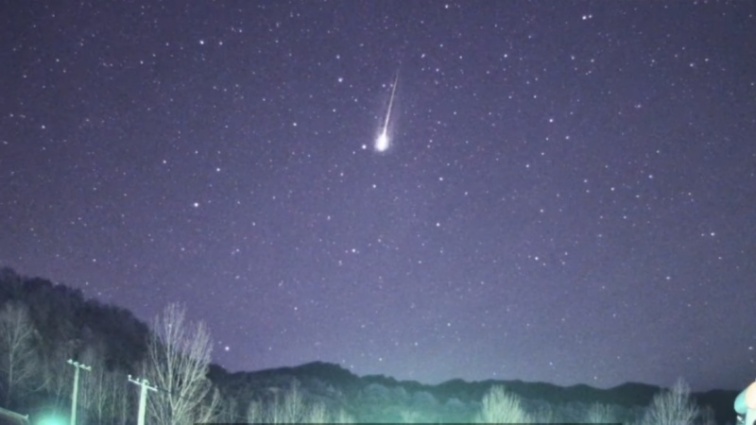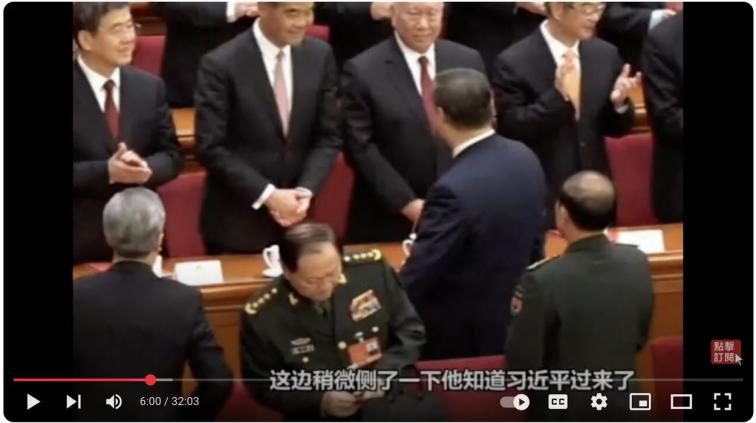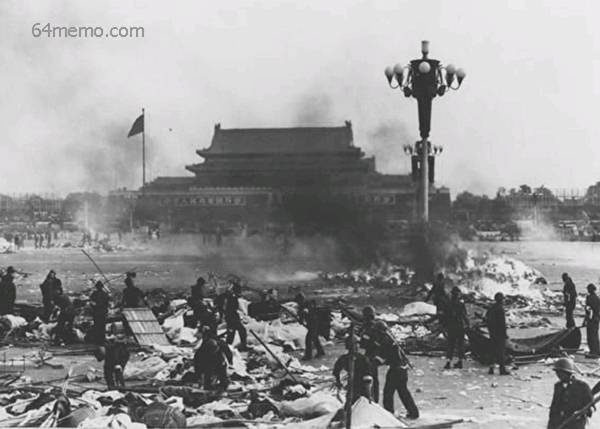Zhang Youxia, Vice Chairman of the Central Military Commission of the Communist Party of China, remarked that Xi's faction has been entirely apprehended. (Video screenshot)
[People News] Following reports of the death of former Vice Chairman of the Central Military Commission (CMC) Xu Qiliang, interpretations of the political implications have varied widely in overseas media. On June 10, an article titled “The Deaths of Xu Qiliang, Wang Shaojun, and He Hongjun: A Grand Strategy by Zhang Youxia” was published online. The author argues that most analyses fail to accurately uncover the cause behind Xu Qiliang’s death, focusing only on superficial details like the farewell ceremony and vaguely blaming Xi Jinping, speculating that he may have been behind it.
The article asserts that Xu Qiliang’s death marks Zhang Youxia’s declaration to lead a regime change. Despite facing internal dissent within the Party and divisions among senior elders, Zhang appears ready to risk everything to bring an end to the fifth-generation leadership under Xi Jinping. More specifically, if the Party and elder factions remain paralysed by internal splits, the military will take all necessary measures to forcibly redirect the current government’s course.
Xi Jinping and Zhang Youxia Jointly Removed Xu Qiliang from Power
The article notes that after Jiang Zemin’s military confidants You Xigui and Jia Ting’an stepped down at the 19th Party Congress, it marked the complete loss of Jiang’s control over the military. Xi Jinping then established an Air Force–centred leadership under General Xu Qiliang, gaining absolute control over the military. This strategy focused on defending the capital by implementing military lockdowns in Beijing.
At the time, Air Force General Yi Xiaoguang commanded the Central Theatre Command, deploying 300,000 field troops to encircle Beijing. Their primary task was to strip the Central Guard Bureau of its political function, seize control of the capital’s defences, occupy all key strategic points, and place the entire city, along with central government organs, under military surveillance.
The downfall of the Central Guard Bureau severed the CCP leadership’s connection to armed force, rendering the phrase “the Party commands the gun” hollow. The military, except for Xi himself, became a core of power untouchable by anyone else, standing above Party and state institutions.
In short, when Xi first consolidated real power, it was through the Air Force, particularly figures like Xu Qiliang and Yi Xiaoguang. It was said at the time, “Xi’s faction is the Air Force; the Air Force is Xi’s faction.” This laid the military foundation for Xi’s constitutional amendments and consolidation of power during the Two Sessions.
However, with imperial cunning, Xi eventually purged the Air Force and replaced them with his own loyalists from the 31st Army of Fujian. Air Force General Yi Xiaoguang was retired at age 63. In September 2021, Lin Xiangyang, who came from the 31st Army, replaced him as Central Theatre commander. Shortly after, other senior Air Force officials such as An Zhaoqing (Armed Police Political Commissar), Fan Xiaojun (Northern Theatre Political Commissar), and Ding Laihang (Air Force Commander) also retired, marking the end of the Air Force era. Xu Qiliang was left politically isolated. During this process, Zhang Youxia emerged as a central figure and Xi’s close confidant.
Zhang Youxia’s Rise: Marked by Zhou Hongxu’s Appointment to Head the Central Guard Bureau
The article explains that during the purge of Air Force generals, Zhang Youxia actively supported Xi’s efforts at the CMC level, signalling their rapidly warming relationship. Xi, disillusioned with the Central Guard Bureau, sought a battlefield-hardened general from field units to rebuild the bureau. At Xi’s request, Zhang recommended Major General Zhou Hongxu, former artillery regiment commander in the 40th Army and then Deputy Chief of Staff of the Northern Theatre Army. Almost simultaneously with Yi Xiaoguang’s retirement in July 2021, Zhou was appointed director of the Central Guard Bureau. This appointment underscored Xi’s trust in Zhang, with their relationship reaching a peak.
Wang Shaojun’s Mysterious Death Signals Xi–Zhang Rift
After Deng Xiaoping’s death, the Central Guard Bureau had been tightly controlled by Jiang loyalist You Xigui, who was eventually promoted to full general in 2004 and became a pillar of Jiang’s behind-the-scenes control. You later appointed his protégé Cao Qing as Guard Bureau chief, and then promoted an even younger figure—Wang Shaojun—to oversee Xi’s personal security. Wang was promoted to lieutenant general and served until he retired with Jiang’s faction at the 19th Party Congress, moving to an advisory role in the CPPCC.
After Zhou Hongxu took over the Guard Bureau, it became clear he aligned with Zhang Youxia. Xi, sensing that his life was now in Zhang’s hands, sought a counterbalance. He recalled Wang Shaojun to the Guard Bureau as an advisor, pairing him with Zhou Hongxu—nominally as a collaborator, but actually to monitor and limit Zhou’s power.
After the 18th Party Congress, Xi, though formally holding top Party, state, and military roles, still faced real military control by Jiang's faction. He allied with the Hu-Wen (Tuanpai) faction to launch massive anti-corruption purges, sweeping away Jiang loyalists. By the 19th Party Congress, Xi had formally centralised all power.
According to inside sources, at this stage, Xi’s imperial ambitions grew unchecked. To achieve a lifetime rule and balance other factions, Xi “made peace” with the Jiang faction: he promised not to persecute Jiang Zemin and his family, and in return, the Jiang camp backed Xi’s lifelong rule.
As a result, many of Jiang’s protégés switched loyalty to Xi—figures like Wang Huning, Ding Xuexiang, and Han Zheng. In the military, similar cases included Qin Shengxiang, He Hongjun, Wang Shaojun, and Xu Qiliang.
However, the article argues that recalling Wang Shaojun back to the Guard Bureau acted as a catalyst for the power struggle. In April 2023, an unexpected incident occurred—Wang Shaojun died under suspicious circumstances.
The state media only reported on July 24, 2023, that Wang had died of illness on April 26. The three-month delay raises suspicions that he died a violent or sudden death. Afterwards, the Guard Bureau fell completely under military control.
Xu Qiliang’s Death Destroys Xi’s Last Hope of Regaining Military Power
The article says that after being sidelined by Zhang Youxia in the military, Xi desperately tried to stage a comeback, bringing back Xu Qiliang, who had seniority and prestige. This posed a serious threat to Zhang.
Reports claim that Vice Chairman He Weidong, Political Work Department Executive Deputy He Hongjun, and former CMC Vice Chairman Xu Qiliang participated in an armed counterstrike led by Xi. The plan failed, and they were executed. With Xu’s death, the military purge is nearly complete, and Xi’s old power structure has collapsed.
Zhang Youxia Declares War on Xi and the Jiang Faction
Commentators argue that Xi’s biggest mistake was not pursuing the Jiang faction to the bitter end, letting Jiang Zemin and Zeng Qinghong off the hook. The consequences are now fully unfolding—and Xi will one day regret it bitterly.
After Xi’s “reconciliation” with Jiang, many Jiang faction members pledged loyalty to Xi.
Like Wang Huning, Ding Xuexiang, and Han Zheng. In the military, this included Qin Shengxiang, He Hongjun, Wang Shaojun, and Xu Qiliang—all former Jiang loyalists. Today, three are dead, and one has been purged.
The author concludes that Zhang Youxia has now struck hard against the Jiang faction.
Analysis suggests Zhang is deeply at odds with Jiang’s faction and is pushing for a major reshuffle of top CCP power.
He prefers to rely on sidelined Hu-Wen-Tuanpai figures over Jiang loyalists, provoking discontent among core Jiang-aligned elders like Wang Huning, Ding Xuexiang, Zeng Qinghong, Jia Qinglin, Zhang Dejiang, Yu Zhengsheng, Li Zhanshu, Li Lanqing, Li Changchun, Luo Gan, He Guoqiang, Liu Yunshan, and Zhang Gaoli. Though they outwardly comply, they quietly resist Zhang’s efforts. Xi, though largely sidelined, still formally holds top positions and keeps trying to claw back power.
Thus, Zhang’s attempt to lead a generational transition and oust Xi remains highly difficult. This explains the current chaos within the CCP—extreme and bizarre contradictions that confuse outside observers.
In this critical moment, Zhang Youxia has finally revealed his true nature as a “warrior with a bow—the white-headed eagle.”
As the article concludes, through Xu Qiliang’s death, Zhang Youxia made it clear to the once untouchable CCP elite that no head is harder than a bullet. It was a demonstration of his firm control over the military, and a warning: if the impasse continues, the military will intervene and take all necessary measures—at any cost—to resolve the CCP’s leadership crisis once and for all. △










News magazine bootstrap themes!
I like this themes, fast loading and look profesional
Thank you Carlos!
You're welcome!
Please support me with give positive rating!
Yes Sure!